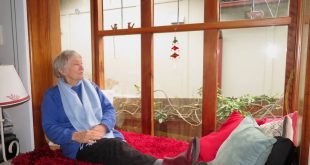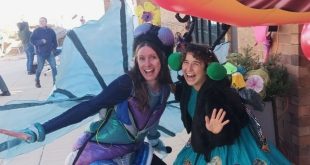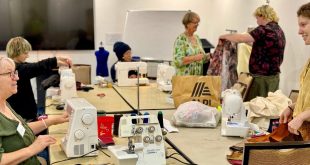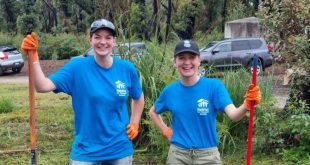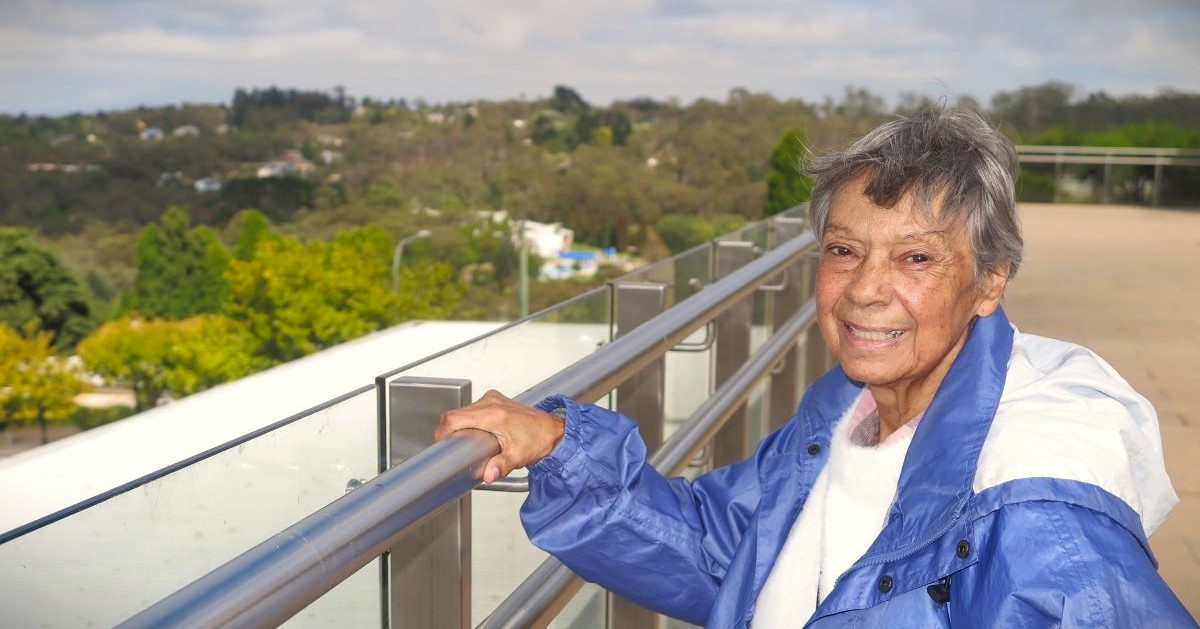
Beloved local community Elder Aunty Carol Cooper, standing in the foreground of ‘The Gully’, her Gundungurra father’s land where she grew up. “I feel at peace here. I feel he’s saying, ‘I’m still here’.”
Story and photos by Linda Moon
Aunty Carol Cooper is a small, humble woman with a big heart and an important message for humanity.
Key Points:
- Local Katoomba woman Aunty Carol Cooper rose above a childhood of extreme schoolyard racism and violence to become a bridge to reconciliation.
- In 2023 the Darug and Gundungurra Elder was awarded an Order of Australia medal for outstanding services to the local community.
- Be inspired by her journey for peace, from the school playground and beyond, in a time when co-operation and working together is more needed than ever to protect life on our planet.
Seventy three-year-old Carol Cooper was born in Katoomba and continues to call it her home. But she still bears the scars of violent childhood racism in the town. In primary school her nose was broken, her lip split and she nearly lost her chin. Her leg was gashed with broken glass. Boys would follow Carol and her siblings home and throw rocks at the family.
The atrocious racism she experienced wasn’t limited to children. Shockingly, it was also perpetuated by teachers. Aunty Carol said a male teacher, who actively hated ‘blacks’, would make her stand outside the classroom in the rain.
The abuse, which included being told she was dumb, affected her schooling. “I can’t write. I still can’t spell,” Carol tells. She felt that being smart would only make the bullying worse.
Remarkably, the descendent of the Gundungurra and Darug people remains big-hearted and free of bitterness. “That was life back then,” she reflects. “I don’t think I was the only one who got bashed up.”
Childhood in The Gully
That ‘life back then’ included living in The Gully: traditional lands in the heart of Katoomba. These were re-occupied by Aboriginal people in the early twentieth century due to white settlement of the Mountains.
To Carol and her family, The Gully was home. “It was really good there,” she recalls. “We didn’t want to move.”
In 1957 residents were forcibly removed from their homes for the construction of the Catalina Racetrack. Carol can still recall the traumatic sight of her family home being burnt down. In some recognition of the past, in 2002 The Gully was officially declared an Aboriginal Place.
A life of service
Rather than self-pity or retaliation, Carol’s life has been one of power through contribution and caring. She continues to be a long-standing volunteer at Katoomba North and South Public Primary schools and St Canice’s, Katoomba. A former State basketball player, she’s involved in the Katoomba North School Koori Club and coaches a girl’s basketball team.
A member of multiple community groups, Carol won a Zest Award for Community Volunteering in 2012. She was invited as a delegate for the second International Women for Peace Conference in Dili, Timor-Leste in 2009. She also helped found the Blue Mountains Aboriginal Culture and Resource Centre.
Further promoting respect for and knowledge of her culture, Carol co-authored Fun and Games in Gundungurra. The activity book (published in 2007) teaches Gundungurra language to children.
In recognition of her community work, in 2023 she was awarded the Order of Australia medal. It’s a reminder, she says, that someone is always watching what we do. This includes what’s most important in life: how we treat each other.
“This was my story, but there were a lot more people that were worse off than me and deserve this award more,” she says. “And if it wasn’t for the ANTAR (Australians for Native Title and Reconciliation) women, my story would never have been told.”
Promoting peace and reconciliation
Described by Zest as “the backbone of the reconciliation movement in the Blue Mountains for the past 20 years,” Carol’s work has been hands-on at the grass roots level.
In her volunteer work in Katoomba’s primary schools she tries to help bullies build their confidence, see the error of their ways and be more responsible. To the bullies, she would explain: “Everybody’s somebody. And they’ve all got feelings.”
Actively intervening against bullying, she assists by walking vulnerable kids, including those with disabilities, to the bus, and more. “I like to make sure the kids are okay,” she says. It’s a role Carol learned from her beloved older sister Jenny. The oldest girl in the family, Jenny looked after her nine siblings while their parents worked, often shielding them from bullying. “She was the best sister anybody could have and just wanted to fix that,” Carol says.
Sharing her own childhood story and culture has been another way of building a bridge between cultures. “I love kids,” Carol says. This extends beyond the Indigenous, to embrace children of all cultures.
Lessons from her Elders
Carol attributes everything she’s learned and her ability to care to female mentors in community work, and having a close, loving family who taught her all about the land and how to treat others.
Her father (a member of the Gundungurra tribe) served in World War II and a reserve (Digger Cooper Reserve) in Leura is named in his honour. A Blue Mountains bridge (Auntie Joan Cooper Bridge) was named after Carol’s mother. A Darug woman born in Parramatta, Joan also won an Order of Australia.
Carol says, “We had it good. We’ve always been a close family. We’ve been blessed; we’ve been lucky. They [her parents] taught us the right way.”
Her mother constantly taught to look after people and help where needed. Of Carol’s victimisation, her mother said, “I know you’ve got scars Carol, but forget the scars, don’t even think of them. If you’re not looking you can’t see it. Always, always be nice to people. Because sooner or later people are going to be nice back to you.” In a world blighted by war, violence and social division, it’s a vital message.
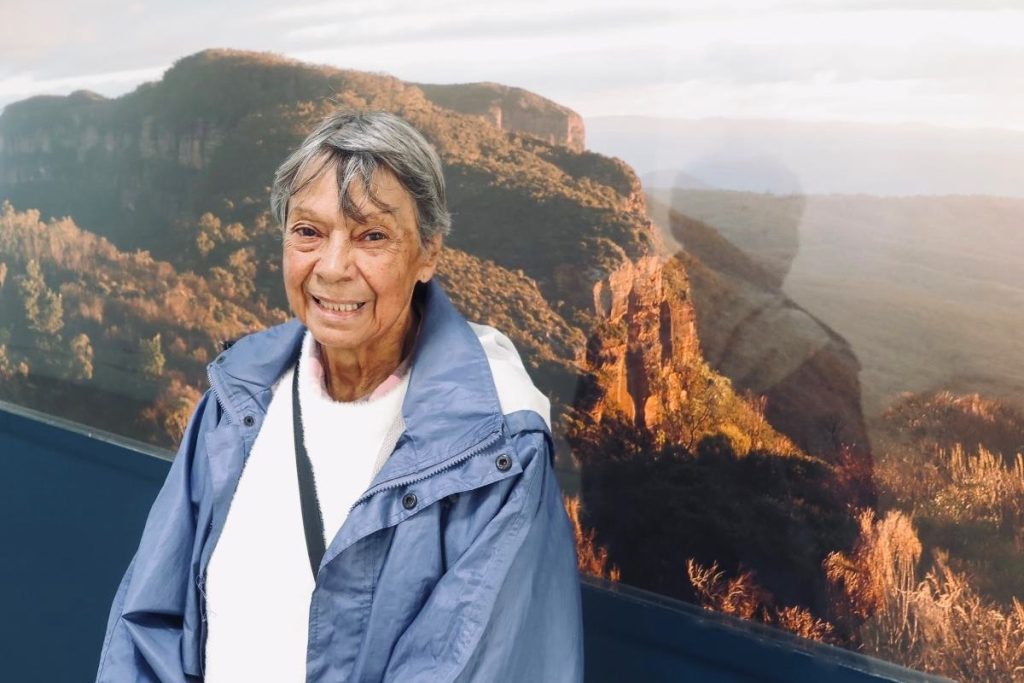
Aunty Carol Cooper at the Blue Mountains Cultural Centre. Carol was unable to have children of her own, but her lessons of peace, love and co-operation will endure in the lives of the many children and adults whose lives she has touched.
“Treat people how you’d like to be treated” – Aunty Carol Cooper.
Take Action:
- Find ways to volunteer and contribute to peace and co-operation within your local community.
- Help stand against racism, bullying and violence. Teach your children to do the same.
- Learn about Indigenous culture and how its’ values of land care, contribution and community, can help save the planet.
Share this article:
This story has been produced as part of a Bioregional Collaboration for Planetary Health and is supported by the Disaster Risk Reduction Fund (DRRF). The DRRF is jointly funded by the Australian and New South Wales governments.
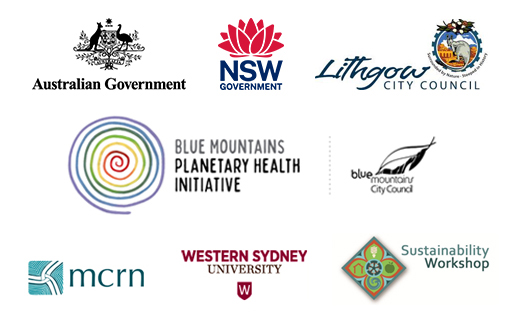
More from around the region
Did you know that old lino, window putty, and adhesive can contain asbestos? Yesterday the Asbestos & Hazardous Materials Management Conference kicked off with a pre-conference workshop at the Blue Mountains Planetary Health Centre. It included hands-on `spot the asbestos` and asbestos sampling sessions. This year`s theme is `Working together for a safe and healthy future`. #asbestos #hazardousmaterials #conference #planetaryhealth #bluemountains #katoomba
A huge thank you to Josh Logan from Logan Signs, Lithgow, for installing our Circular Water Signage in time for our World Animal Day Celebration today at the Blue Mountains Planetary Health Centre (33-39 Acacia St Katoomba). We have a full program of events with lots of information on how to prepare for the summer ahead and how to create urban areas that help us share our home respectfully with all species. It will be a fun family day too with storytime, craft and live music for kids! (Link in profile) #worldanimalday #planetaryhealth #familyday #katoomba #bluemountains
And our Wild Life exhibition is now up for World Animal Day tomorrow at the Blue Mountains Planetary Health Centre. Photographs by Warren Hinder, Merryl Watkins, Holly Kent and Tracy Burgess. Check out all the other events from stalls, talks, possum box demo, kid`s craft and animal storytime, plant based food and live music to Bushcare. @33-39 Acacia St Katoomba Link in profile. #planetaryhealth #worldanimalday #katoomba
Join the Blue Mountains Planetary Health Initiative at World Animal Day this Saturday 5 October for a discussion on the history of the Plant Based Food Movement in Australia and a discussion of exciting contemporary trends. It will be followed by a Plant Based Cheese Degustation to launch the Plant Inspired Community Cooking Project. This will be a series of cooking classes to introduce the community to plant based cooking techniques. The event is free but places are limited so bookings essential (link in profile): https://bit.ly/3Bzbwhu
#plantbasedcooking #worldanimalday #bluemountains #katoomba #planetaryhealth #communitycooking
We share the Blue Mountains with so many extraordinary beings but have you seen them and do you know their names? Do you know the difference between a Royal Spoonbill and an Eastern Shrike-tit, or the difference between a bandicoot and an antechinus? Come and check out our Wild Life Exhibition at World Animal Day this Saturday to learn more from the stunning photographs by Warren Hinder, Merryl Watkins, Holly Kent and Tracy Burgess. There will be also be a Breakfast with the Birds at 8.30am, Animal Storytime and Craft for kids from 10am, stalls, talks, food and live music. The day is free but please book via Eventbrite to help us cater (link in profile): https://bit.ly/4eMhbz0 @bluemountainswalks @merrylwatkinsphotography @bestofbluemountains
#royalspoonbill #easternshriketit #wildlife #birdsofthebluemountains #bluemountains #katoomba #worldanimalday #biodiversity #planetaryhealth
To coincide with the first day of Bushfire Season we launched Air Watch at the Planetary Health Centre yesterday. For the last seven years Blue Mountains Unions & Community have been working tirelessly to ensure residents of the Blue Mountains and Lithgow are able to measure and track the quality of the air we breathe. The Blue Mountains Planetary Health Initiative has worked closely with them over the last year and now there are 20 PurpleAir monitors distributed throughout the Blue Mountains and Lithgow, including one at the Planetary Health Centre. You can now view real time air quality measurements at each of our local news sites and on the Purple Air Map https://map.purpleair.com We have 10 more sensors available, so if you’d like to install a sensor, members of BMUC will be at World Animal Day at the Planetary Health Centre this Saturday 5 October to take applications and share more information about the project. Bookings for World Animal Day here (link in profile): https://www.eventbrite.com.au/e/world-animal-day-promoting-respectful-cohabitation-tickets-1029328889417
It was a fabulous day yesterday as each speaker highlighted how critically important this project is: Dr Rosemary Dillon CEO of Blue Mountains City Council Trish Doyle MP Dr Jenna Condie from Blue Mountains Parents for Climate Dr Maggie Davidson, environmental scientist from Western Sydney University Matthew Riley, Director Climate and Atmospheric Science from NSW Department of Climate Change, Energy, the Environment and Water and Peter Lammiman and Ann-Maree McEwan from the BMUC’s Airwatch Committee.
@bluemountainsunionists @nswdcceew @bluemountainscitycouncil @westernsydneyu @trishdoylemp @parentsforclimatebluemountains #airqualilty #airqualitymonitors #bluemountains #planetaryhealth
Treat yourself this weekend with a fun-filled and informative World Animal Day event at the Planetary Health Precinct in Katoomba. As well as a Breakfast with the Birds, stalls and a possum box demonstration, there will be a fabulous wildlife exhibition with photos by Warren Hinder, Merryl Watkins, Tracy Burgess and Holly Jayne; live music with Mem Davis, Joe Flood and Duck Keegan; lots of fun for kids with Sharon Baldwin and Naomi Crew leading animal storytime and craft with Julie Refferty; delicious plant based, gluten and dairy free treats, pastries and donuts from Clean Cravings; a plant based cheese degustation and warming Dahl, rice roasted cauliflower with veggies, pakoras, tamarind chutney, and salad courtesy of Bibi’s Kitchen. Come and learn more about Blue Mountains Bird Observers, Blue Mountains Conservation Society, WIRES, Action for Animals Blue Mountains and Animal Sanctuaries, Wombat Rescue, the Women’s Shed, and Animal Welfare Laws in Australia.
Guest speakers throughout the day will include Elizabeth Ellis, lecturer and author of Australian Animal Law; Hal Ginges, a local lawyer and animal activist from Action for Animals who advocates for animal rights and raises money for sanctuaries; Mark Berriman who has been President of the Australian Vegetarian Society NSW since 1989, as well as Co-ordinator for Animal Liberation NSW, Director of the Natural Health Society of Australia and the World League for Protection of Animals; and Teya Brooks Pribac, a researcher in the area of animal studies and the award-winning author of Enter the Animal. She’s also published Not Just Another Vegan Cookbook and will be sharing her culinary skills with the community in the Plant Inspired Community Cooking Project.
The event is free but please book your place to help us cater (link in profile): https://www.eventbrite.com.au/e/world-animal-day-promoting-respectful-cohabitation-tickets-1029328889417
#worldanimalday #plantbased #planetaryhealth #katoomba #bluemountains
We are so looking forward to kicking off World Animal Day Celebrations on Saturday 5 October with an 8.30am Breakfast with the Birds. Join Paul Nagle from the Blue Mountains Bird Observers on a guided bird walk around the Planetary Health Precinct visiting different habitats on the site to observe and talk about the birdlife that is resident and that visits the site. Binoculars are highly recommended.
World Animal Day will be an inspiring family day celebrating the extraordinary diversity of animals we share our world with! The theme is `Promoting Respectful Cohabitation`. Bookings for the Breakfast with the Birds (link in profile)
or here:
https://www.eventbrite.com.au/e/breakfast-with-the-birds-tickets-1028664983657
#birdlife #breakfastwiththebirds #katoomba #worldanimalday #bluemountains #planetaryhealth #respectfulcohabitation
We all need clean air to breathe, but how can we tell how clean our air is?
Thankfully the Air Watch subcommittee of Blue Mountains Unions & Community has worked for years to find ways to help us measure the quality of the air we breathe. Over the past year the Blue Mountains Planetary Health Initiative has worked with them to install Purple Air Quality monitors across our bioregion from Lithgow to the Lower Mountains. You can now view real time air quality on each of our Local News Sites!
Air Watch`s Purple Air quality monitors give the Blue Mountains` 78,000 residents, workers and 3 to 5 million/year visitors the power to make timely, informed decisions about their activities and health. It will also be a reliable source of data for the scientific community.
To coincide with the start of the Bushfire Season on Tuesday 1 October, we`re inviting the whole community to join us to launch Air Watch Blue Mountains and Lithgow at the Planetary Health Precinct. If you`d like to join us book a place here https://bit.ly/4dp2qko (link in profile)
#airquality #purpleair #bluemountainsunionscouncil #planetaryhealth #bluemountains #katoomba #bushfireseason
Today`s the day for the Blue Mountains Sustainability Festival! @bluemtns_sustainability_fest
We`ll be at the Speakers Forum at the Blue Mountains Cultural Centre at 10.15, talking about volunteer opportunities with the Blue Mountains Planetary Health Initiative, and then giving a presentation at 2.30pm. There`s a jam-packed speakers program, community stalls and workshops, and a Shopping Trail through Katoomba and Leura. You can find more information on the website at https://resilientbluemountains.org/sustainability-festival/
#sustainability #slowfashion #slowshopping #fashiontrail #circulareconomy #planetaryhealth #community #katoomba


